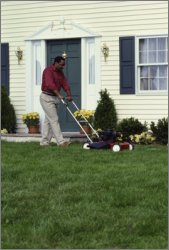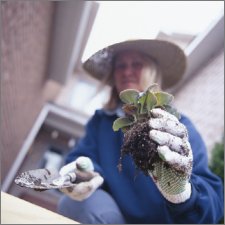The Dangers of 6 Common Lawn and Garden Tools
by www.SixWise.com
Summer wouldn't be the same without outdoor barbecues, flowers
blooming alongside neatly trimmed bushes and being able to
compare your new riding mower's 20-hp engine with your neighbor's.
So while we here at Sixwise.com encourage you to indulge in
all of summer's grand and simple pleasures, we ask that you
do so with a bit of safety in mind.
No one wants to spend a breezy summer day in the emergency
room, but due to injuries from common lawn and garden tools,
the U.S. Consumer Product Safety Commission (CPSC) says that
a surprising number of people are doing just that.
|

Lawn mowers send nearly 80,000 Americans to the hospital
every year.
|
According to CPSC, an estimated 230,000 people are treated
in emergency rooms each year for injuries they sustained from
lawn and garden tools. And while any tool (even a seemingly
harmless garden trowel or hose) has the potential to cause
harm if used carelessly, or left out where a child could find
it, the following six lawn and garden tools are the ones that
should only be used with your utmost care and caution.
1. Lawn Mower
Not only are close to 80,000 Americans injured badly enough
by lawn mowers each year that they require hospital treatment,
but the number is increasing, found a study by Johns Hopkins
Bloomberg School of Public Health.
Who is getting injured most often? According to the researchers,
children under 15 and adults age 60 or older.
Lawn mowers are dangerous not only because of their spinning
blades, but also because debris can be propelled from them.
Getting hit by such debris, such as rocks or branches, was
one of the most common causes of lawn mower injuries, the
study found.
"These are machines with sharp blades spinning at 160
miles per hour just inches away from our feet and hands. Everyone
needs to respect the dangers and use common sense," said
David Bishai, MD, PhD, MPH, senior author of the study and
associate professor in the Department of Population and Family
Health Sciences at the Bloomberg School.
To keep safe, Bishai recommended:
-
Wearing long pants, close-toed shoes with gripped soles
and goggles while mowing.
-
Clearing debris from the yard ahead of time.
-
Using care and wearing protective gloves when servicing
the mower or changing blades (and never while it's running).
-
Not carrying passengers on riding mowers.
-
Not allowing children under 16 to operate a riding mower.
-
Mowing the lawn only in good weather conditions and avoiding
doing so on very hot days.
-
Keeping children, pets and others away from the lawn
while it's being cut.
2. Barbecue Grill
Out of the 66 million people who use a barbecue grill each
season, some 20,000 will end up in the emergency room because
of grill-related accidents.
Among the most serious are fires and explosions, of which
the National Fire Protection Agency says occur some 6,000
times in an average year. The costs of these and other grill
accidents adds up to $29 million in damages.
Runoff from greasy foods adds to fire risks, and children
can easily get burned from touching an unattended grill. To
reduce your risks:
-
Don't leave the grill while you're cooking, or while
it's still hot.
-
Make sure your grill is in good working condition. If
it's over 10 years old, you may want to replace it, as
newer grills have improved safety features.
-
Remove new propane tanks from your vehicle immediately,
as hot weather can make them leak.
-
Keep children away from the grill at all times. The HearthGate
barbecue protection gate is ideal for this.
3. Garden Chipper or Shredder
Chippers and shredders are excellent tools to reduce branches
into mulch (the former) or leaves and other organic matter
into compost (the latter). But, similar to a lawn mower, these
machines have sharp, quickly spinning blades that can easily
cause harm.
Recently, a Connecticut man was almost dragged into a chipper
when a rope attached to a branch caught his foot as the branch
was being fed into the machine. Fortunately, his co-workers
quickly shut the machine off, but he still received a serious
head injury.
Aside from this obvious risk of getting limbs or fingers
too close to these machines' blades, there is also a risk
of flying debris and, as some of these machines can be very
loud, long-term
damage to hearing. If you are going to operate a chipper
or shredder, it's essential that you:
|
If you use a protective gate, like the HearthGate
Barbecue and Fireplace Protection Gate, you can
grill in peace knowing that kids and pets won't get
too close to the heat.]
-
Wear protective clothing such as goggles, gloves
and earplugs. Be sure you are not wearing loose-fitting
clothing that could get caught in the machine.
-
Keep your hands and fingers clear of the blade.
Don't take chances! If you need to feed something
into the machine, use a stick to push it in.
-
Make sure that rocks or other hard material are
not fed into the chute.
-
IF you every need to service or unclog the machine,
UNPLUG it before putting your hands anywhere near
the blade. Otherwise, it's possible to accidentally
switch it back on when your hands are inside.
-
Keep children and pets away from a chipper/shredder
at all times.
-
Only operate these machines when you are free from
distractions.
|
4. Chainsaw
Some 36,000 people are treated in emergency rooms each year
because they have been injured by a chainsaw, according to
the Centers for Disease Control and Prevention (CDC).
Chainsaws are often used for pruning, felling tees, and cutting
up branches or logs. The dangers of these powerful tools are
three-fold:
-
The blades can quickly lacerate arms, legs or digits.
-
Debris can fall or be propelled onto the operator.
-
The loud noise they create can cause long-term hearing
damage.
To operate a chainsaw safely, the CDC recommends the following
precautions:
-
Make sure the blades are properly sharpened and lubricated.
-
Choose the proper size chainsaw for the job.
-
Only use chainsaws that have safety features such as
a chain brake, hand guards (front and rear), stop switch,
chain catcher and spark arrester.
-
Wear a hard hat, goggles, hearing protection, work gloves
and chainsaw chaps (legwear that is resistant to cuts).
-
Make sure bystanders are a safe distance away, at least
30 feet, or, if felling a tree, at least two tree lengths
away.
-
Pay attention to the branches you are cutting -- if they
are under tension they can snap back and cause serious
injury.
5. Pruning Shears/Weed Wackers
|

Even seemingly innocent flowerpots can be dangerous
if you try to lift one that's too heavy.
|
One wrong cut with a pruning shear or weed wacker can easily
sever a finger or toe. Further, it's also easy to get strained
or cut, or to fall off a ladder, if you attempt to reach too
far while pruning. When using pruning shears or a weed wacker,
always:
-
Know where you hands, fingers and feet are -- don't make
a cut until you do!
-
Wear heavy gloves and close-toed shoes.
-
Don't strain to reach a far-off spot; move the ladder
or yourself instead.
-
Make sure the blades are sharp.
-
Don't try to cut a branch that's too big for the tool.
6. Flowerpots
Yes, flowerpots. According to the UK's Royal Society for
the Prevention of Accidents, flowerpots are the second most
dangerous garden tool, after lawn mowers. Why? Because a filled
flowerpot, and even some empty ones, are heavy, and many of
us try to move them in ways we shouldn't. Back strains and
sprains are the result. Flowerpots are also prime tripping
hazards. What can you do?
-
Don't attempt to lift a heavy flowerpot by yourself.
-
Put the pot where you want it, then fill it.
-
Always use a wheelbarrow or other device to transport
the pot where you need it.
-
Keep flowerpots out of heavily trafficked areas so they
won't pose a tripping hazard.
-
Keep flowerpots off of counters or ledges where they
could fall on children or pets.
Recommended Reading
30,000 Finger Amputations Yearly: The Most Common Finger-Loss Accidents and How to Avoid Them
Serious Injury Toll in the Supposed Safest of Places Now Tops 12 Million: What You Need to Know to Be Safe
Sources
Consumer
Affairs: Lawn Mower Injuries Increase Nationwide
ABC
News: Kill Grill Dangers
The
Connecticut Post Online: May 5, 2006
CDC:
Preventing Chainsaw Injuries
The
Times Online May 6, 2006
Consumer
Affairs: Lawn and Garden Safety Tips